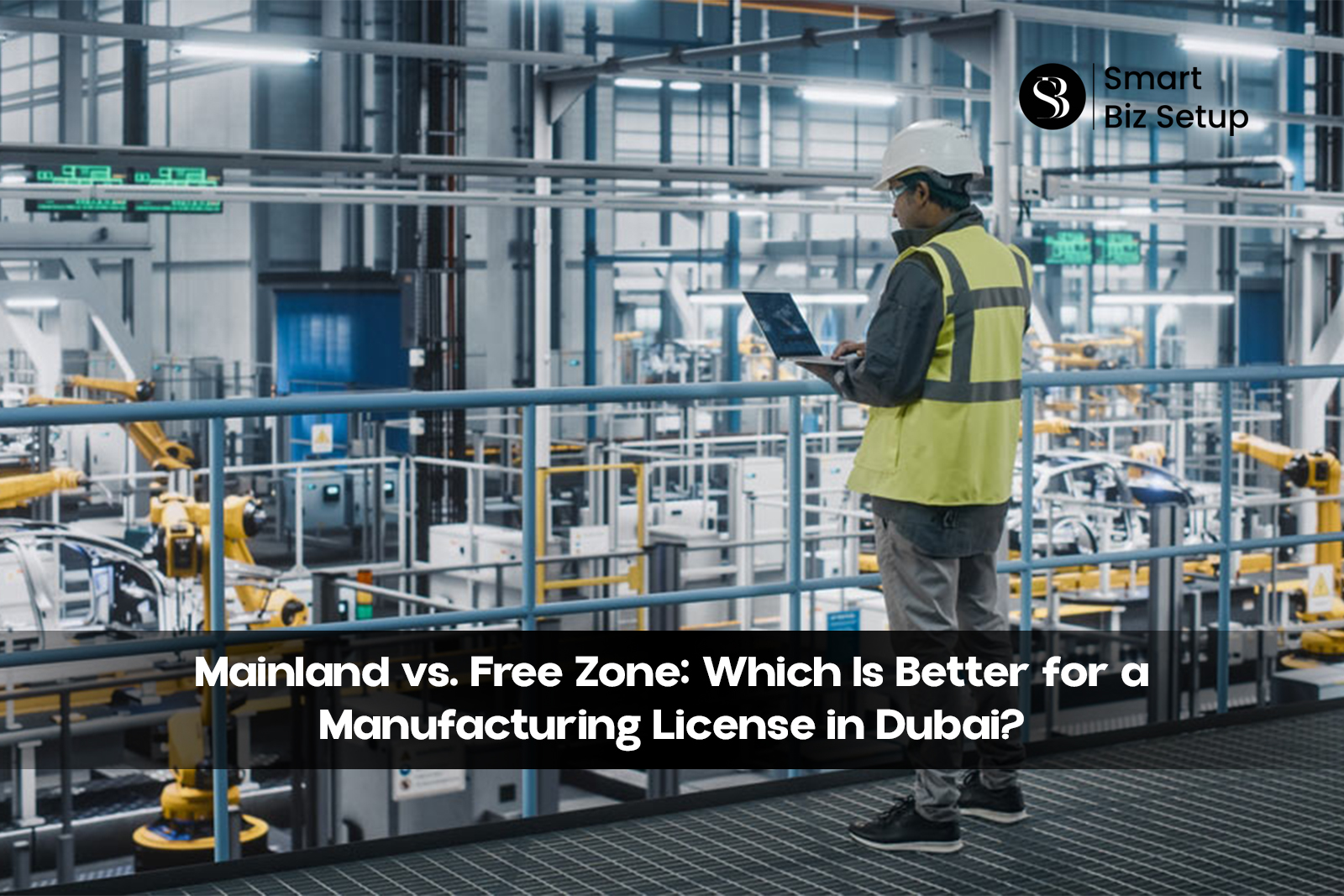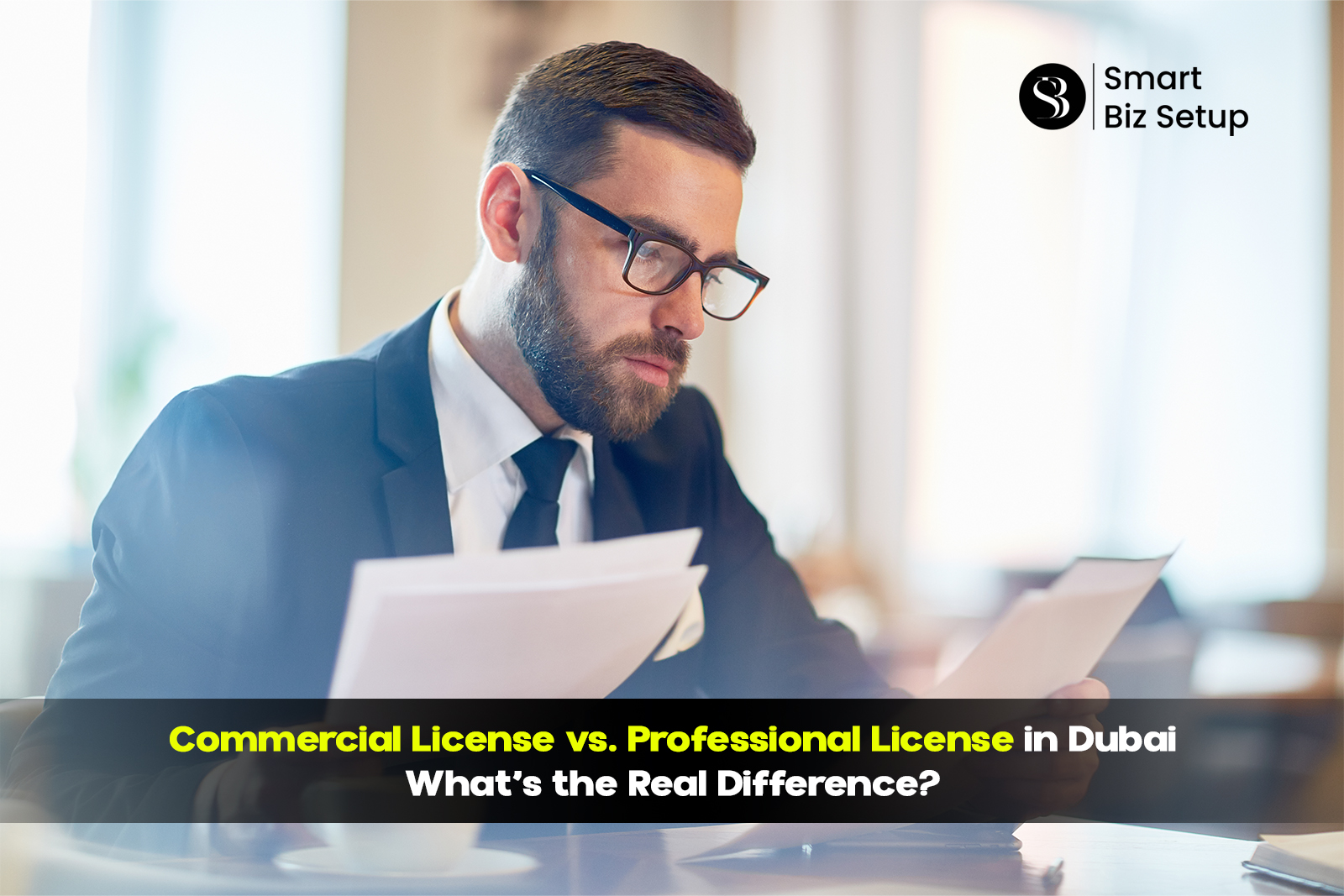Commercial license vs. Professional license in Dubai: What’s the Real Difference?
Starting a business in Dubai is exciting, but here’s where most entrepreneurs get stuck: choosing the right trade license. Should you go for a commercial license in Dubai or a professional license in Dubai? Both fall under popular Dubai DED license types, yet they serve completely different purposes.
The difference might sound small on paper, but in reality, it can decide how your business operates, who can own it, and even how much you spend every year. Curious which one really fits your business? Let’s break it down for you in this blog.
What is a Commercial license in Dubai?
A commercial license in Dubai is given to businesses that are mainly involved in trading activities. This means buying, selling, importing, or exporting goods. Whether you plan to run a retail shop, a contracting company, or a general trading business, this license is what makes it possible. It is one of the most common Dubai trade license types because it covers a wide range of business activities.
Example: If you want to open a company that imports electronics and sells them in Dubai, you will need a commercial license.
Documents Required for a Commercial License in Dubai
1. Mainland Setup Requirements
Whether you’re setting up on the Mainland or in a Free Zone, the core documents typically include:
- Completed application form (including Ultimate Beneficial Ownership information)
- Passport copy of the owner(s)
- Digital passport-size photograph
- Emirates ID and visa copy (if you’re a UAE resident)
2. Mainland–Specific Requirements
Sources related to registering with the Department of Economy and Tourism (DET) or Department of Economic Development (DED) in Mainland Dubai indicate additional documentation, such as:
- Completed application form
- Tenancy contract or proof of office space (attested Ejari lease)
- Memorandum of Association (MoA) and Articles of Association (AoA), where relevant (e.g. LLCs)
- Passport copies of founders or shareholders
- Payment of license issuance fees
3. Free Zone & Specialised Authority Requirements
If you’re establishing in a specialised Free Zone like DHCC (Dubai Healthcare City), the documentation becomes more detailed, including:
- Passport (plus residence visa pages, if applicable) of manager(s), shareholder(s), legal representative(s)
- Emirates ID (optional if residing in UAE)
- No Objection Certificate (NOC) from current UAE sponsor (if applicable)
- Company-specific documents:
- For corporate shareholders: Trade license, MoA, AoA, Commercial Register, Certificate of Continuity/Good Standing, UBO (Ultimate Beneficial Ownership) details
- Business plan (for clinical or regulated activities)
- Corporate resolutions (e.g. to incorporate or establish a branch)
What is a Professional license in Dubai?
A professional license in Dubai is issued to individuals or companies that provide services based on skill, knowledge, or expertise. It’s ideal for consultants, IT service providers, lawyers, doctors, teachers, and other professionals. When you look at a Dubai business license comparison, this license is different because it focuses only on services, not the trading of goods.
Example: If you want to start a digital marketing agency in Dubai, you will need a professional license to operate legally.
Documents Required for a Professional License in Dubai
1. General Requirements
When applying for a professional license in Dubai, the Department of Economy and Tourism (DET, formerly DED) requires basic documents that establish the applicant’s identity and intended activity:
- Completed application form issued by DET
- Passport copies of the owner and any partners
- Digital passport-size photograph
- Visa and Emirates ID copy (if the applicant is a UAE resident)
2. Mainland–Specific Requirements
For businesses applying on the Dubai Mainland, additional documents are needed to comply with local regulations:
- Trade name reservation certificate approved by DET
- Initial approval certificate from DET
- No Objection Certificate (NOC) from current UAE sponsor (if applicable)
- Tenancy contract or office lease agreement (Ejari-registered)
- Qualification or degree certificates related to the chosen professional activity
- Civil Company agreement or Memorandum of Association (MoA), if there are multiple partners
- Local Service Agent (LSA) agreement (required for foreign-owned firms setting up on the Mainland)
3. Free Zone & Specialised Authority Requirements
If the professional license is being obtained through a Free Zone or specialised authority (such as Dubai Healthcare City for medical professionals), additional documentation may apply:
- Passport copies (and residence visa pages, if applicable) of the manager, shareholder(s), and authorised representatives
- Emirates ID (if the applicant resides in the UAE)
- NOC from current sponsor (if applicable)
- Proof of qualifications (certifications, diplomas, or licenses, depending on the regulated profession)
- Business plan (required for some consultancy, healthcare, or education-related activities)
- Corporate documents if a company is involved as a shareholder:
- Existing trade license
- Memorandum & Articles of Association
- Certificate of Incorporation or Commercial Register
- Certificate of Continuity/Good Standing
- UBO (Ultimate Beneficial Ownership) declaration
- Resolutions passed by the parent company authorising the establishment of a branch or subsidiary
Why Choosing the Right License Matters
Picking the right license in Dubai is not just paperwork; it decides how your business will run. Choosing the wrong one can lead to restrictions on what activities you can do, ownership complications, higher costs, or even compliance penalties.
For example, if a consulting firm mistakenly applies for a commercial license, it may run into problems during audits or visa applications because the license doesn’t match its real business activity.
Difference Between Commercial and Professional License in the UAE
Commercial vs Professional Trade licenses in the UAE differ from each other in multiple criteria. In the table below, we have made a clear distinction for a better understanding to make more informed decisions.
| Criteria | Commercial license | Professional license |
| Definition | Issued to businesses engaged in trading, importing, exporting, and selling goods or commodities. | Issued to individuals or firms offering professional services based on skills, expertise, or qualifications. |
| Business Activities Covered | Buying and selling goods, general trading, contracting, logistics, real estate brokerage, retail & wholesale, etc. | Consultancy, legal services, IT services, accounting, auditing, marketing, design, education, healthcare, and other skilled professions. |
| Ownership Structure | In many cases, a UAE national is required as a local sponsor (51%) and foreign investor (49%), although certain activities now allow 100% foreign ownership in the Mainland. | Can be owned 100% by expatriates (for most activities), but requires a Local Service Agent (LSA) for Mainland setup (LSA has no ownership, just a service fee). |
| Legal Form | Typically incorporated as an LLC (Limited Liability Company) in Mainland Dubai. | Usually registered as a Sole Establishment (for individuals) or a Civil Company (for partnerships). |
| Capital Requirements | Some activities may require a minimum share capital (depending on jurisdiction and activity). | Generally, there is no strict capital requirement beyond initial setup costs. |
| Visa Eligibility | Eligible for multiple visas depending on office space size and activity (good for companies hiring staff). | Limited visa allocation compared to commercial licenses (depends on activity and space). |
| Office Space Requirement | Mandatory physical office or warehouse space in most cases. | Office space is required, but it is usually smaller than that of trading companies. |
| Scope of Operations | Broader — allows trading across the UAE and internationally. Can deal with goods, commodities, and distribution. | Narrower — restricted to services only. Cannot engage in the trading of physical goods. |
| Audit Requirement | Many commercial license activities require annual financial audits for compliance and renewals. | Audits may or may not be mandatory depending on the activity and authority. |
| Profit & Liability | Liability limited to the company (LLC structure protects owners). | Liability may fall directly on the individual or partners (Civil Company or Sole Proprietorship). |
| Taxation | Subject to UAE corporate tax (if applicable based on income thresholds and activities). VAT registration is required if turnover exceeds AED 375,000. | Same taxation rules (corporate tax & VAT) apply, depending on income and thresholds. |
| Cost of Setup | Usually higher, as it involves sponsor arrangements, larger office space, and higher visa quotas. | Typically, lower setup costs, especially for sole proprietorships or consultancy firms. |
| Banking | Banks usually prefer commercial licenses as they represent trading firms with clear cash flow. | Banking is available but may require additional proof of expertise, contracts, or service agreements. |
| Examples of Businesses | Trading companies, contracting firms, logistics providers, general trading (import/export), real estate brokerages, retail shops. | Consulting firms, accounting practices, law firms, IT service providers, marketing agencies, medical clinics, and education providers. |
Step-by-Step Process to Apply for a Commercial License in Dubai
Step 1: Reserve Your Trade Name
Choose a name for your company and submit it to the Department of Economy and Tourism (DET) or the Free Zone Authority. The name must follow UAE naming rules and match your business activity.
Step 2: Get Initial Approval
Apply for initial approval from DET (for Mainland) or the Free Zone Authority. This shows that the government has no objection to your business activity.
Step 3: Prepare the Required Documents
Get all your documents ready.
Step 4: Submit the Application and Pay Fees
Submit all your documents to DET or the Free Zone Authority and pay the official license fees.
Step 5: Receive Your Commercial License
Once approved, you will be issued your Commercial license. You can then apply for visas, open a corporate bank account, and start your trading operations.
Step-by-Step Process to Apply for a Professional License in Dubai
Step 1: Reserve Your Trade Name
Choose a business name that reflects your services and submit it to DET or the Free Zone Authority for approval.
Step 2: Get Initial Approval
Apply for initial approval by providing your personal and business details. This confirms that your professional activity is allowed in Dubai.
Step 3: Prepare the Required Documents
Prepare the necessary paperwork.
Step 4: Submit the Application and Pay Fees
Submit all documents to DET or the Free Zone Authority along with the license fees.
Step 5: Receive Your Professional License
Once approved, you will receive your Professional license. You can then set up your company immigration file, apply for visas, and open a business bank account.
Disclaimer: The steps above are the general process for getting a Commercial or Professional license in Dubai. However, depending on your chosen activity, business structure, or Free Zone authority, there may be additional steps or approvals required. It’s always best to check with the Department of Economy and Tourism (DET) or the Free Zone Authority before applying.
Cost Factors Explained
The commercial license in Dubai costs, and the professional license in Dubai costs differ because of several factors:
Local Sponsor vs. Local Service Agent
- Commercial licenses usually involve local sponsor fees.
- Professional licenses require a local service agent, which is often less costly.
Office Space Requirements
- Commercial licenses may need larger office or warehouse spaces.
- Professional licenses typically need smaller office setups.
Visa Quota Size
- Commercial licenses allow for more employee visas, increasing overall costs.
- Professional licenses usually come with limited visa allocations.
Activity Type
- Regulated activities (like healthcare or education) may need special approvals, adding to both license types’ costs.
Conclusion
Choosing between a commercial license and a professional license in Dubai is not just about filling forms; it’s about making the right choice for your business future. A commercial license is best suited for trading goods and larger operations, while a professional license is ideal for service providers and skilled experts. Picking the correct license will save you time, money, and a lot of stress in the long run.
How We Can Help You
At SmartBiz Setup, we simplify the entire process of obtaining your business license in Dubai. Whether you need a commercial license or a professional license, our team will:
- Help you choose the right license type based on your activity
- Guide you through trade name reservation and initial approvals
- Prepare and submit all the required documents
- Assist with office space, visa applications, and bank account opening
- Ensure your company is 100% compliant with UAE regulations
Instead of struggling with confusing rules, you can rely on SmartBiz Setup to make the journey smooth and stress-free.
👉 Ready to get your business started? Visit smartbizsetup.com and let our experts handle everything for you.
Frequently Asked Questions (FAQs)
1. What is the difference between a commercial and a professional license in Dubai?
A commercial license in Dubai is for businesses involved in trading, importing, or exporting goods. A professional license in Dubai is for service providers such as consultants, IT firms, doctors, lawyers, and other skilled professionals. The key difference is: commercial = trading goods, professional = offering services.
2. Can a professional license be converted to a commercial license?
Yes, in most cases, a professional license can be converted to a commercial license in Dubai, but the process involves approvals from the Department of Economy and Tourism (DET) and updating your legal structure. It’s not automatic, and you must reapply with the right documents and activity list.
3. Do I need a local sponsor for a commercial license in Dubai?
For Mainland commercial licenses, a UAE national is usually required as a local sponsor or partner. However, in Free Zones, foreign investors can hold 100% ownership without a sponsor.
4. How many visas can I get with a commercial license in Dubai?
The number of visas under a commercial license in Dubai depends on the size of your office or warehouse and the activity type. Generally, commercial licenses allow more visas compared to professional licenses, making them suitable for companies with larger teams.
5. Is a professional license in Dubai cheaper than a commercial license?
Yes, usually a professional license in Dubai costs less than a commercial license, because it does not require large office spaces or sponsor arrangements. However, the final cost depends on factors such as activity type, office rent, and approvals needed.
6. Can I run an online business under a professional license?
Yes, many online businesses in Dubai can operate under a professional license, especially if they are service-based (like digital marketing, freelancing, or consulting). But if your online business involves selling physical products, you will need a commercial license.









